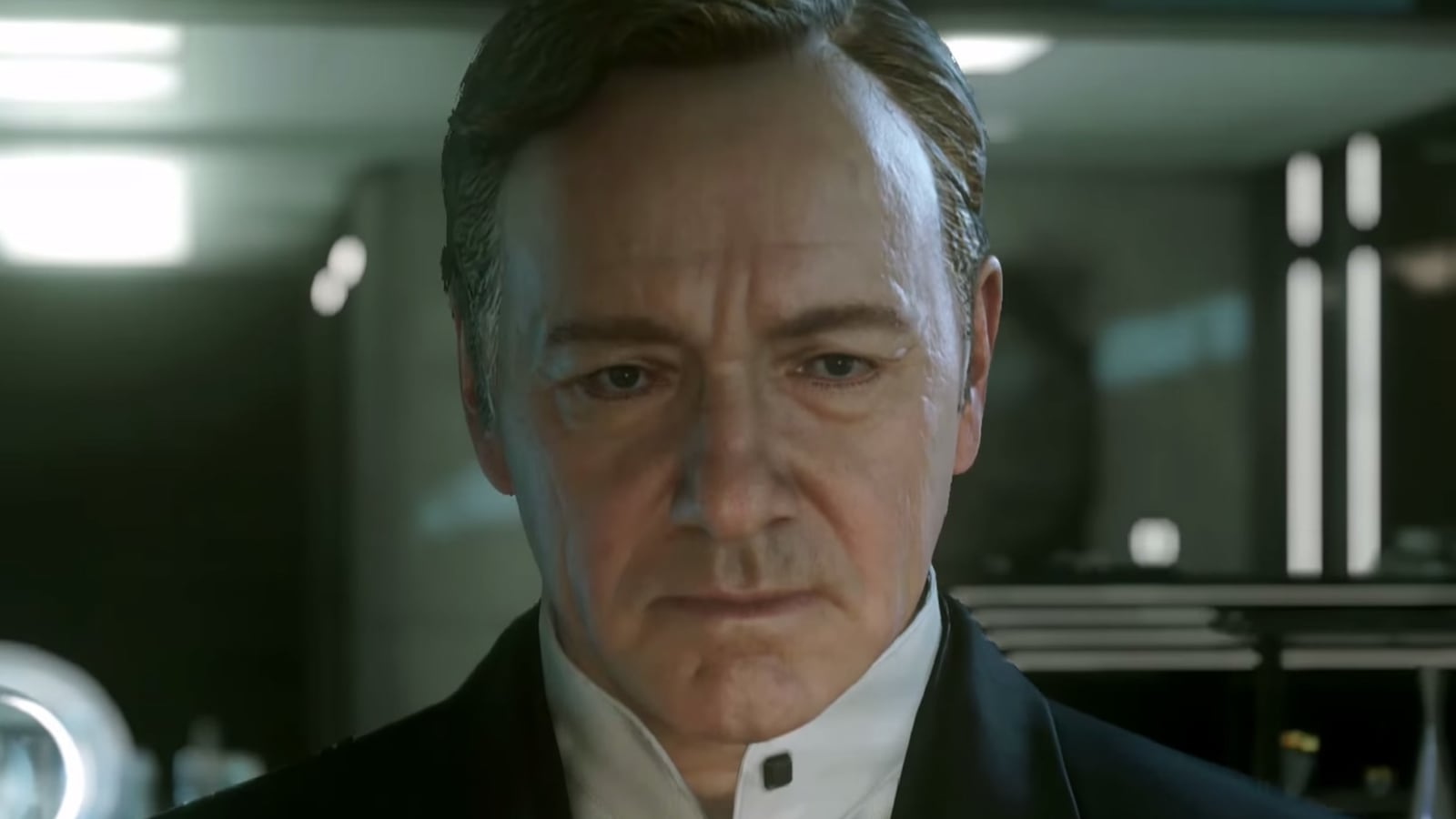In the opening moments of Call of Duty: Advanced Warfare, players are introduced to 2054 Seoul. North Korea has attacked, and you are a member of the U.S. military called in to help. Special suits allow you and your team to hover over gaps and jump to superhuman heights. Your new “smart grenades” seek out enemy soldiers, so you’ll never have to worry about another wasted throw. Swarms of drones fly overhead and rain death from above. It’s a crazy ride, which Call of Duty hasn’t really been in a while—especially after the critical and commercial disappointment that was last year’s Call of Duty: Ghosts.
After going through dozens of North Korean enemies, a melodramatic sequence features your comrade’s ultimate sacrifice. Without character development, the moment doesn’t carry much weight, but it’s a moment that propels the rest of the narrative forward. Soon after, you’re at his funeral. And while you can’t actually walk around, you can look at the other attendees. Sitting in chairs staring at the casket are friends, family, and… Kevin Spacey?
The Kevin Spacey is at this digital funeral? Yup. And then he gets up, puts his hand on the casket, and walks off without a word, and you’re no longer thinking about whatever is supposed to be going on in that scene. You’re just thinking about the fact that you totally just saw Kevin Spacey in a video game, because that’s weird. Really, really weird.
There is no Kevin Spacey equivalent in video game voice acting. It’s a shame, too, since voice actors like Troy Baker and Nolan North have voiced hundreds of characters, and anyone with even a passing familiarity with modern video games will have heard them speak. Troy Baker even voices Mitchell, Advanced Warfare’s protagonist. But even though he has had dozens of starring roles in games like The Last of Us, Bioshock Infinite, and the recently released Middle-earth: Shadow of Mordor, I have no idea what he looks like, because his characters don’t look like him. And that’s a good thing, because it means that Troy Baker’s place in any given video game universe does nothing to affect its potential for immersion.
Immersion is something that game developers discuss frequently when talking about their games, and with good reason. Players want to get lost in a new world. Troy Baker’s voice might be familiar from game to game (although he has quite a range), but I’m not thinking of Mitchell as Troy Baker, even when I see him in cutscenes, because Troy Baker is more of a concept than an entity.
Kevin Spacey is an entity. Everyone knows who Kevin Spacey is and what Kevin Spacey looks like. When you’re looking at him, even if it’s a digital representation, you know in your heart of hearts that you’re not looking at some character in some different world; you’re looking at Kevin Spacey. More than that, you’re looking at Kevin Spacey’s character in House of Cards, Frank Underwood. Throughout the Netflix series, Underwood just talks about power, power, power. He’s obsessed with it. Spacey’s character in Advanced Warfare, Jonathon Irons, heads up ATLAS, the world’s largest Private Military Company, and he too is obsessed with power. From the outset he describes his company in those terms: “ATLAS has the single largest military in the world, but we answer to no country. We don’t sell policy; we sell power. We are a super-power for hire.”
And it’s distracting. All around you is this interesting future world with all kinds of different technologies that put a much-needed spin on some of Call of Duty’s core gameplay mechanics, but the narrative (and Kevin Spacey) keeps you from really engaging.
In a film, the presence of a well-known actor is also a distraction, but it’s an accepted part of the cinema experience. Right from the early days, the same faces would appear over and over again. The best performances can make you forget that you’ve seen a person before, but this is a limitation of reality and not a benefit. There is no digital equivalent. There is no reason that the character of Jonathon Irons should look like Kevin Spacey. But he does.
And part of what makes it weird is that he stands alone as a recognizable figure. In Beyond: Two Souls, the player controls Jodie, who is played by Ellen Page, as she interacts with others, including Willem Dafoe. Both Jodie and Dafoe’s character look like their acting counterparts, but because both of them are in it, it feels less weird. You’re always looking at Ellen Page, so the presence of another well-known figure doesn’t seem so odd. It’s still a distraction, but not to the level that Advanced Warfare’s single celebrity is.
But all of these appearances by well-known figures bring to light a more obvious issue: video game technology isn’t good enough to accurately render photorealistic faces. It’s the so-called “Uncanny Valley,” where things are close enough to realism that they start to become uncomfortable. In a close-to-human face, every inhuman trait becomes magnified. And Kevin Spacey magnifies this further. We all know how Kevin Spacey is supposed to look, and when he see this digital thing that looks like him and sounds like him but is distinctly not him, you really know that something isn’t right. His eyes are lifeless and the movements of his mouth don’t match up with his words. It’s like an even less comfortable version of Robert Zemeckis’s motion-captured adaptation of The Polar Express.
But even when technology moves beyond that point and video games achieve perfect character photorealism, the idea that movie star likenesses could start to show up more and more is worrisome. Celebrities sell, which is presumably the entire point of putting Kevin Spacey in Advanced Warfare and Ellen Page in Beyond: Two Souls. These are names that people recognize and may sell a few extra copies, but so what? If Brad Pitt shows up in Halo 6 or Michael Fassbender in the next Assassin’s Creed, it will damage the fiction that the developers have set out to create.
There’s nothing wrong with having well-known actors work behind the scenes, although celebrity is hardly a guarantee of quality. Peter Dinklage lent his voice (not his looks) to the recently released Destiny, but his phoned-in performance was universally panned. On the other hand, Andy Serkis provided the voice and motion capture for the protagonist of the criminally underappreciated Enslaved: Odyssey to the West. That game has some of the best facial animation in video game history, and it did that by using Serkis’s talents but not his likeness. I’d be happy to see more of that, and many games are using facial capture to make their characters feel more alive.
But the line is clear: Just as you wouldn’t want to see the same characters in Dragon Age and Skyrim, putting these familiar faces in games hinders stories. Call of Duty: Advanced Warfare is compelling on its own. Adding Kevin Spacey to the mix takes one of the worst aspects of cinema and translates it to a medium that doesn’t need it and definitely doesn’t want it.






